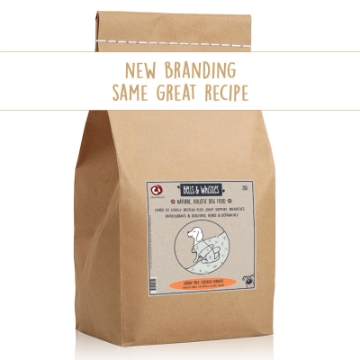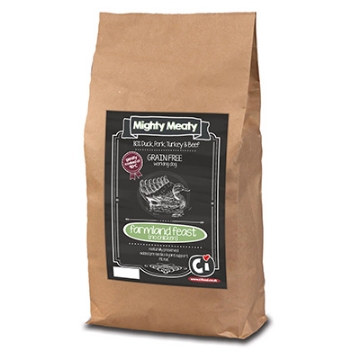Struvite Stones & Crystals
Dog food for bladder stones (struvite)
If your dog has been diagnosed with struvite stones or crystals, the number one thing you can do for your dog is to ensure they drink lots & lots of water & that they able to evacuate frequently.
The more dilute the urine is the less likely minerals can clump together to form struvite crystals and stones. Ideally feed a wet food, but if that isn’t practical then it’s vital that you add lots of water to their dry biscuits.
Struvite Stones
Struvite stones usually form when large amounts of struvite crystals are present in combination with a urinary tract infection.
Struvite stones can often be completely dissolved by using special prescription diets available from your vet. These diets encourage greater water consumption, contain controlled amounts of protein and also alter the acidity of the urine.
In around 98% of cases, struvite stones in dogs are caused by urinary tract infections combined with pre-existing struvite crystals in the urine. It is now generally accepted that a special diet is not needed for dogs with struvite stones once the stones are either dissolved or surgically removed.
If your dog had recurrent bladder infections that led to struvite stones, it is critical that these infections are kept under control in the future to prevent new stones forming. Obviously if an infection takes hold, then antibiotics are needed to ensure that it is eradicated quickly before new stones can form again, but after that there are some very effective natural remedies that you can use to prevent future infections.
Alternatively putting a couple of large bunches of curly parsley through a blender with some water to make a parsley ‘soup’ and adding it daily to their dinner at a rate of 1 teaspoon per 4kg is a powerful way of preventing UTI infections (& it’s got lots of other health benefits too). Also giving unsweetened, freeze-dried cranberries (available online) will help prevent bacteria from taking a hold in the urinary tract.
Many urinary care supplements/nutraceuticals harness the properties of parsley & cranberry & may be more convenient than preparing your own (such as Urinovet by Vet Expert).
Around 2% of struvite stones are not formed from a urinary tract infection – these are known as ‘sterile’ or ‘metabolic’ struvites. In these cases, a lower phosphorus maintenance diet may be helpful alongside plenty of water & slightly acidic urine. Our lowest phosphorus food combined with a decent protein content is Tickety Boo Angus Beef.
Struvite Crystals
Around 40% of dogs have some struvite crystals in their urine so the presence of crystals alone does not mean that your dog has, or will develop, struvite stones.
Similarly, urine samples that have been refrigerated or have sat around for a few hours often start to form struvite crystals, so crystals are only truly significant if found in very fresh urine (30 minutes old max). Often therefore vets seek to monitor & re-test more than once before drawing any firm conclusions.
That said, struvite crystals struggle to form in urine that is slightly acidic (below a PH of 7.0) and without crystals there is no chance of stones, so it makes sense to feed a food that isn’t likely to alkalise the urine. Feeding a diet with a good level of meat in it will help guard against this, as will adding some Apple Cider Vinegar (ACV) to their dinner (1teaspoon-1tablespoon for a 25kg dog). It’s important not to add supplements such as ACV without having a means of testing the urine acidity, so buying a home testing kit is important.
But remember, the more dilute the urine is the less likely minerals can clump together to form crystals and stones, no matter what the urine pH is. This is why it’s so important to include lots (& lots) of water in with their dinner and, if possible, feed a wet food.
The foods listed below all provide a strong level of protein and, in the case of dry food, have additional herbs & botanicals which may help.
(Please be aware that we are not vets. The information given here is intended as a general guide & should not replace the directions received from your vet)
Urinovet for dogs (30 tablets)
- a supplement for dogs prone to urinary infections & struvites.
- contains cranberry, parsley & glucosamine
- 1 tablet per 10kg of bodyweight
- **BUY 3 & GET 10% OFF !!**
Top Drawer Chicken & Brown Rice 395g
- A delicious paté style wet food - use as a complete meal or topper
- Gluten Free with 60% chicken plus brown rice & vegetables
- Added salmon oil, seaweed, cranberry & joint support
- Protein: 12%, Fat: 5.5%, Fibre: 1.5% (Dry Matter: Protein: 48%, Fat: 22%, Fibre: 6%)
Top Drawer Chicken & Sweet Potato 395g
- A delicious paté style wet food - use as a complete meal or topper
- Grain Free with 65% British chicken plus sweet potato & other vegetables
- Added pre-biotics, seaweed, cranberry & joint support
- Protein: 11.5%, Fat: 5.5%, Fibre: 1.5% (Dry Matter: Protein: 46%, Fat: 22%, Fibre: 6%)
Top Drawer Fish & Brown Rice 395g
- A delicious paté style wet food - use as a complete meal or topper
- Gluten Free with 60% fish plus brown rice & vegetables
- Added salmon oil, seaweed, cranberry & joint support
- Protein: 11%, Fat: 4.5%, Fibre: 1.5% (Dry Matter: Protein: 44%, Fat: 18%, Fibre: 6%)
Top Drawer Turkey & Sweet Potato 395g
- *A delicious paté style wet food - use as a complete meal or topper
- *Grain Free with 65% British turkey plus sweet potato & vegetables
- *Added pre-biotics, seaweed, cranberry & joint support
- *Protein: 10.5%, Fat: 8.5%, Fibre: 1% (Dry Matter: Protein: 35%, Fat: 28%, Fibre: 6%)
Bells & Whistles Chicken Dinner
- Grain free & high in protein with added superfoods, joint support & healthful herbs
- Suitable for puppies & active adult dogs. Beet pulp free.
- Protein: 29%, Fat: 16%, Fibre: 3.2%, Calories: c. 371k/cal per 100g
- 2kg trial bag & 12kg sack (48kg bulk deal also available)
Bells & Whistles Chicken Dinner (Small Bite/Puppy)
- Grain free & high in protein with added superfoods, joint support & healthful herbs
- Smaller kibble size for small puppies or active adult dogs. Beet pulp free.
- Protein: 29%, Fat: 16%, Fibre: 3.2%, Calories: c. 371k/cal per 100g
- 2kg trial bag & 12kg sack (48kg bulk deal also available)
Bells & Whistles Duck Dinner
- Grain free & high in protein with added superfoods, joint support & healthful herbs
- Suitable for puppies & active adult dogs. Beet pulp free.
- Protein: 28%, Fat: 16%, Fibre: 3.2%, Calories: c. 371k/cal per 100g
- 2kg trial bag & 12kg sack (48kg bulk deal also available)
Bells & Whistles Lamb Dinner
- Grain free & high in protein with added superfoods, joint support & healthful herbs
- Suitable for puppies & active adult dogs. Beet pulp free.
- Protein: 29%, Fat: 16%, Fibre: 3.2%, Calories: c. 371k/cal per 100g
- 2kg trial bag & 12kg sack (48kg bulk deal also available)
Mighty Meaty (original) Poultry & Fish
- Based around the principles of raw feeding, 80% meat/fish + 20% grain free veg etc.
- With added Joint Support, Omega 3 & healthful herbs & botanicals. Suitable for puppies too!
- Protein: 37%, Fat: 15%, Fibre: 3%, Calories: c. 374k/cal per 100g
- 1.5kg trial bag & 13kg sack (52kg bulk deal also available)
Mighty Meaty Farmland Feast
- Based around the principles of raw feeding - 80% meat (duck, pork, turkey & beef)
- With added Joint Support, Omega 3 & healthful herbs & botanicals. Suitable for puppies too!
- Protein: 38%, Fat: 19%, Fibre: 2.5%, Calories: c. 402k/cal per 100g
- 1.5kg trial bag & 13kg sack (52kg bulk deal also available)
Mighty Meaty Fish Medley
- Based around the principles of raw feeding = 80% fish + grain free veg, herbs etc.
- Added Joint Support, healthful herbs & botanicals & packed with Omega 3. Suitable for puppies too!
- Protein: 35%, Fat: 20%, Fibre: 2%, Calories: c. 406k/cal per 100g
- 1.5kg trial bag & 13kg sack (52kg bulk deal also available) (52kg Bulk Deal Also Available)












































